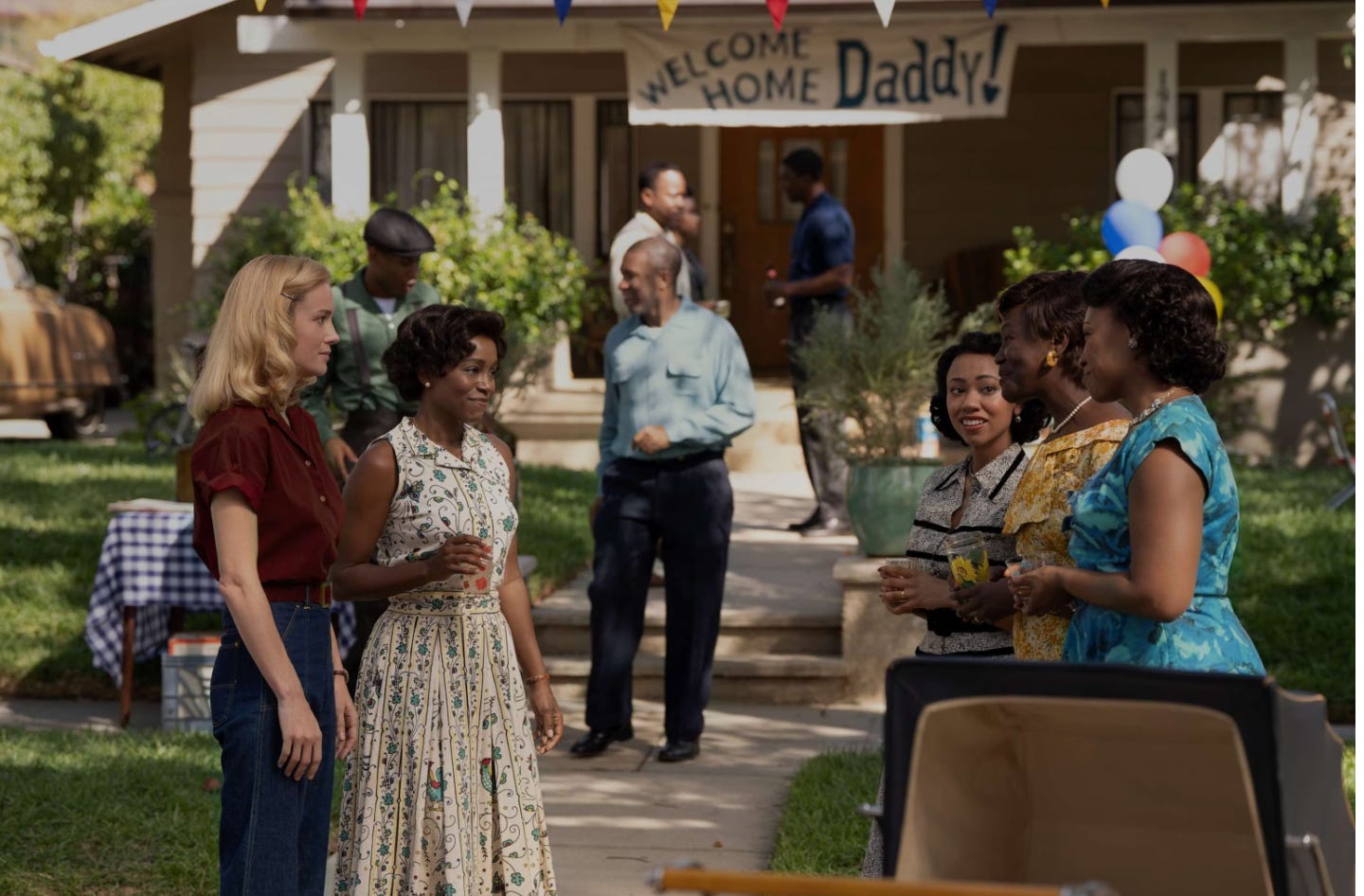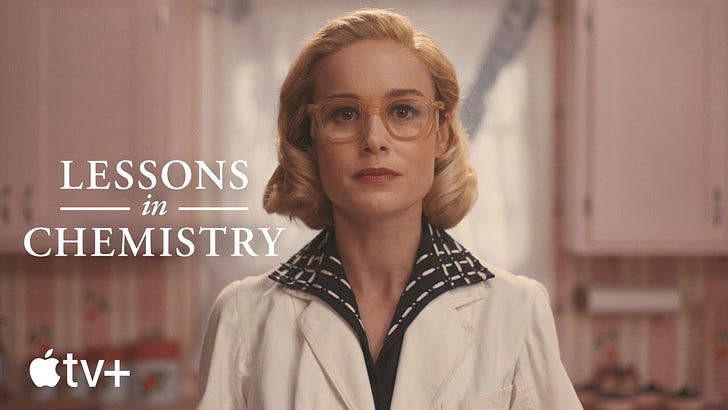"Lessons in Chemistry" Offers up Serious Life Lessons
ch-ch-ch-ch-changes- Turn and face the strain.
Lessons in Chemistry is on Apple TV+
Grade: A (Well done adaptation of a beloved best-seller by Bonnie Garmus, Beautiful storytelling)
A Young Woman Ahead of Her Time
Spanning the eventful young life of its heroine, Elizabeth Zott (Brie Larson, that’s Captain Marvel to you), in the 1960s, Lessons in Chemistry, the 8-part series produced by Media Res, Hello Sunshine and Echo Films is a crash course in humility, resilience, and the transformative power of love.
In short, it’s the perfect “Beth” show. It’s like if the Apple TV+ shows Physical and Ted Lasso had a baby and out came this inquisitive, bright young thing. It’s heartwarming and painful in showing us the vulnerability inherent in close and fractured human relationships (Ted Lasso) and centers on a different kind woman ahead of her time charting an unconventional career path (Physical).
Whenever you start doubting yourself, whenever you feel afraid, just remember. Courage is the root of change and change is what we're chemically designed to do.
Elizabeth Zott, a passionate student of chemistry who dedicates her life to research and making advances in science in the late 50s and 60s is no match for the sexual politics and sexism at play in her lab. Given that she’s most likely neurodiverse (ASD) and working among men who are not as gifted in science as she, but more savvy in the ways of the business world (Because let’s face facts: they made up the rules), she’s working against some serious gravity.
But Wait, There’s Love Too
There is reprieve from the work environment pains and that comes in the impressive physical and emotional form of Calvin, played by Bill Pullman’s son, Lewis. The two work together as scientists consumed with the field of abiogenesis, the study of the origins of life from non-living matter, and through this revolutionary work and Zott’s cooking, develop deep feelings for one another. They take in a dog, called 6:30, because Zott discovered him at 6:30 at night outside her home. Yes, she’s very literal. One of the more creative and emotionally wrenching episodes of the season, episode 3, has 6:30 doing the narration. It’s so wonderfully woven together, I had to watch it in piece parts because much like anything worth savoring, you don’t want it to come to its inevitable conclusion.
Chosen Family, Social Issues & Female Cooking Shows
Fired from her lab job for bogus reasons, Zott struggles financially, as a single mom, until she gets her own cooking show, which is a feather in her chef’s hat. Once there, she has to continually advocate for what’s best for the show’s viewers against the loathsome TV studio manager character played by Rainn Wilson (Dwight, The Office), whose main purpose is to undermine her abilities and underestimate her female audience’s propensity for learning chemistry as a part of their cooking lessons. Because, as anyone who ever watched The Office knows, Dwight can’t be trusted.
Luckily as Zott is rebuilding her life with her young daughter, she comes across various people she can count on to help her. She also learns throughout the course of her life to be receptive to help when it’s offered to her (See: life lesson!). Her chosen family includes neighbors like Harriet Sloane, a lawyer and head of her neighborhood’s movement against the city’s bid to build a freeway and effectively tear down a predominantly black neighborhood and Walter, a producer who discovers Zott’s talent in the kitchen and sees her as a future star of her own cooking show, which she becomes.

“Supper at Six” is more than just a cooking show. It’s a community where women are empowered and lift one another up as is evidenced in an episode where Zott encourages a woman to pursue medicine and she does. Social issues of the day like the proliferation of interstate highways causing segregation and women not being allowed to hold certain positions get plenty of airtime and while of interest, I found myself less psychologically invested in these stories. For me, one of the more poignant and effective storylines in trying to convey a similar message was the Calvin-Reverend Wakely friendship. The science vs religion debate happening between these two men of such strong conviction who form such an unexpected understanding of one another - one that transcends race and religion, I found to be more moving because it showed how connection is authentically derived through mutual curiosity and leaning into differences. Less soapbox derivative, more teaching us genuine life lessons.
Like the show Julia on Max about Julia Child, the allure of a female on-air cook in the 60s seems to be the perfect conduit to serve up life lessons in a neat fashion these days. Zott, thankfully doesn’t share the grating sound of Child’s forced New England accent. I’m a sucker for these shows so I’ll just keep on living vicariously over here, watching women cook and having zero desire to cook those meals myself.
Ending - C’est Tout
In an increasingly popular penultimate or finale tactic on Apple TV+ shows, Zott’s big mic drop moment is featured on air, in a live unscripted fashion on “Supper at Six” in which she announces she’s leaving the show. No forewarnings, really. Just this seemingly impulsive act. For The Morning Show viewers, you may recall the same fate befell an equally driven woman making her mark, Bradley Jackson (Reese Witherspoon) in S3, the most recent one. This plot twist made me want to rage quit the show. Although arguably in this instance, Zott is in full command of her choice and in Bradley’s case, she was blackmailed by Elon Hamm, who threatened to expose her deplorable brother’s secret unless she quit.
For fans of the original book by Bonnie Garmus, the ending which gets stuffed into the final 5-10 mins is different here. It’s a tad hokey, but served the plot of the show in seeing Elizabeth take on a teacher role. I’m not sure if this was really true to her character - seeing her evolve into a more affectionate and outwardly empathetic human in the final two episodes. I’m choosing to keep an open mind, however, and believe that with the aid of good friends, a sense of purpose, and the love of chosen family, it’s possible that Elizabeth became a more healed version of her former self and this resulted in positive mindset and behaviorial changes.
After all, “change is the only constant,” as this show reminds us in Zott’s address to her pupils in the final episode. It’s the only thing we can really expect - life’s uncertainties - and sometimes they are a catalyst for magnanimous actions that spark joy and growth. You just have to be willing to concede that to bear witness to light, you must walk jaggedly on cracks and proceed with both caution and courage.
If any of what I just said vibes with you, then see this show.
But also, feel free to listen to Leonard Cohen because he knows a thing or two about cracks and lights.
🎶 There is a crack, a crack in everything
That's how the light gets in 🎶






Bryan gave me this book for my birthday, which I read before we watched this series. I loved both! I think this is a great example of an adaptation that changes up the story in a way that benefits a viewing audience. All the major story beats were present, even though so much was altered in the space between. The biggest changes, of course, were the characters of Harriet and .... the Raine Wilson character, I can’t remember his name.